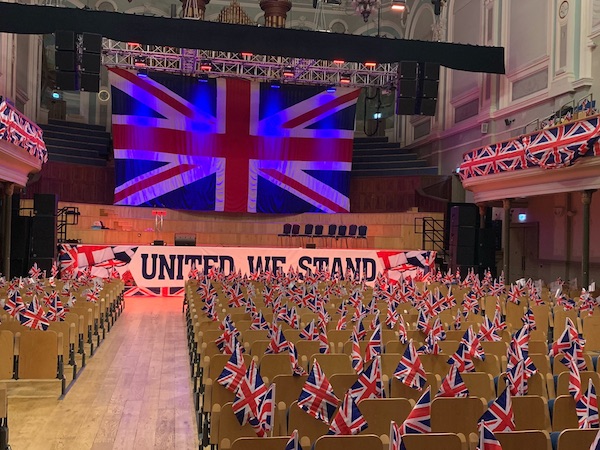
The north of Ireland appears set for an extended period of unionist protest after an event took place on Friday night at the Ulster Hall, the latest in a series of meetings organised by loyalists which have echoed with the word ‘betrayal’.
Filled with hundreds of Union Jack flags, the event took place against the backdrop of a giant Union Jack hung upside down, deliberately intended to “show distress”, to the organisers.
A series of speakers voiced unionist anger over the Brexit deal between the Tories and the EU. One said: “Boris Johnson is a traitor. Sinn Féin smell blood.”
The attendees were mostly male and past middle age, some wearing “No Surrender” t-shirts. Some of those who addressed the audience were dressed in historic costumes. At one point, ‘The Sash’ was blasted out by by a marching flute band.
The event, an attempt to recreate the energy of previous unionist mobilisations, mostly formed a backdrop for an election stump speech by North Belfast candidate DUP Deputy leader Nigel Dodds.
“We stand together in a timely moment for Northern Ireland, for this Ulster that we love,” said Dodds. He blasted “all of our opponents”, with the emphasis on the word “all”.
“To those who would want to tear apart Northern Ireland from the rest of Great Britain, we stand united and we will not allow you to succeed,” he declared. But he was concealing the reality that, as one of the chief architects of Brexit, unionists did not have far to look to find someone who has betrayed them.
The DUP are facing the loss of up to three seats, despite having enjoyed their strongest political position in recent decades by holding the balance of power at Westminster. They held considerable influence at a time of change and vulnerability for the north of Ireland and their treasured union, but their demands for an extreme Brexit served only to undermine that union.
In an attack on the DUP Deputy leader by Ulster Unionist leader Steve Aiken, who had previously expressed support, Aiken accused Nigel Dodds of facilitating the deal by agreeing to a regulatory border in the Irish Sea. “Even HM Treasury says that Northern Ireland will be symbolically separated from the union and our economic union would be undermined,” he said.
It was the latest twist in a Westminster election campaign which has been markedly different to 2017. While the DUP previously saw Brexit as their victory, and took credit for it, they now look set to be undone by their failure to recognise that their plan for a hard border through Ireland could never have succeeded. It was an own goal, and a stunning one at that.
There have been murmurings of loyalist disturbances, amplified by the mainstream media. But the Brexit dispute is now over protocols on trade, health and safety, whose tangible effects are likely to be minimal and whose details could put many people to sleep. Any protest could also have a contrary effect -- after Brexit, a new Tory government will be looking to forge new trade deals, and the support of the US House of Representatives will be of far greater concern to them than what happens at Larne seaport.
The question facing loyalists as they head to the polls this week is in whose interest the DUP are really acting. Some, like former UVF commander Billy Hutchinson, have said they are already preparing for a debate on an alternative to the union.
Counting of votes will begin after polls close at 10pm on December 12. The outcome will prove whether the DUP’s rabble-rousing has had the effect of saving their seats, or if their supporters are ready to withhold votes from those who really betrayed them.
![[Irish Republican News]](https://republican-news.org/graphics/title_gifs/rn.gif)
![[Irish Republican News]](https://republican-news.org/graphics/title_gifs/harp.gif)

